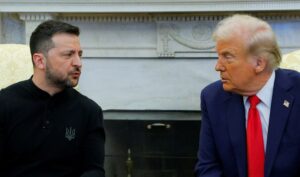Title: Analyzing Recent Diplomatic Tensions and Market Reactions: What Investors Should Know
In a dramatic turn of events at the White House, Ukrainian President Volodymyr Zelenskiy departed after a tense meeting with President Donald Trump. This encounter, characterized by profound disagreement over the involvement of the U.S. in Ukraine’s peace negotiations, has sparked significant discussions in financial circles, igniting fresh concerns among investors.
According to Trump, his revelations on social media reflect his frustrations about Zelenskiy’s stance. "I have determined that President Zelenskyy is not ready for Peace if America is involved because he feels our involvement gives him a big advantage in negotiations. I don’t want advantage, I want PEACE," Trump stated, emphasizing the seriousness of the situation. The multitude of geopolitical challenges looming over the global financial landscape was palpable during and after this meeting.
Market Reactions in Real-Time: A Volatile Landscape
In the immediate aftermath of this contentious interaction, we saw the S&P 500 index experience fluctuations that encapsulated the prevailing uncertainty. Initially, the index dipped but later rebounded, closing up by 0.4%. Such volatility in a major index often signals underlying market apprehension; investors are grappling with the implications of international conflicts on domestic economic conditions.
The euro, meanwhile, fell slightly, indicating that investors are closely monitoring not only U.S. policies but also the broader European response to the evolving situation in Ukraine. In a world where currency valuations fluctuate based on geopolitical stability, the need for investors to stay informed cannot be overstated.
Expert Analysis: Insights from Financial Strategists
Leading market strategists have shared their perspectives on how operational dynamics will be shaped moving forward. Carol Schleif, Chief Market Strategist at BMO Private Wealth, suggested that “Markets will continue to be more focused on tariff policy – how much, who, when – and what it implies for business activity and consumer spending and confidence.” This points to a larger narrative: while geopolitical tensions command immediate attention, underlying economic policies may have longer-lasting impacts on market performance.
In a similar vein, Adam Sarhan, CEO of 50 Park Investments, noted the initial market sell-off. He posited that, while the conversation between Trump and Zelenskiy sparked worry, the ultimate outcome remains uncertain. He emphasized the importance of waiting for clarity: “Zelenskiy is either going to make a deal or he’s not. But does this mean the market is going to get crushed? No.”
Marshall Front, Senior Managing Director at Front Barnett, highlighted the unpredictable nature of the current administration’s approach. “The market likes certainty. It likes a plan,” he remarked. This further illustrates that investors may need to brace themselves for continued volatility as the Trump administration navigates international diplomacy.
Into the Future: What Should Investors Watch For?
As the market adjusts to these new realities, it is vital to recognize that while immediate reactions can be drastic, the long-term impacts hinge on various external factors including trade policies, earnings reports, and overall geopolitical stability. David Wagner, Head of Equities at Aptus Capital Advisors, pointed out, “Much of the motion looks driven by ‘positioning unwinds’ rather than ‘fundamental distress.’” His observation serves as a reminder that while current events are critical, investors must also consider the broader financial contexts.
Concepts such as defense manufacturing require attention as potential beneficiaries of increased military focus and investments. Spencer Hakimian, CEO of Tolou Capital Management, expressed optimism for European defense manufacturers, identifying them as key players amid this turmoil. “We bought those stocks in January for the first time ever,” he noted, indicating a strategic shift by investors toward sectors likely to thrive in times of uncertainty.
Conclusion: The Path Ahead for Investors
In the wake of geopolitical upheavals, it is crucial to maintain a strategic perspective, relying on comprehensive analyses and expert insights. The unpredictability of the market may demand that investors stay agile, continually adjusting to the evolving landscape.
As we at Extreme Investor Network emphasize the importance of informed decision-making, now is the time for investors to monitor developments closely—whether they concern U.S. diplomatic relations, European markets, or sector-specific movements. With the right knowledge and a proactive approach, you can navigate these turbulent times to uncover opportunities that arise from change. Stay tuned for further updates as the situation evolves—your investment strategy could depend on it.

